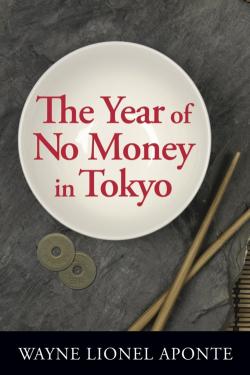The Year of No Money in Tokyo

The Year of No Money in Tokyo,
by Wayne Lionel Aponte, Watkins and McKay,
2009, 168 pages, ISBN 0982055005
Review by William Farr
Japanese commentaries and travelogues from a generation of Westerners who have lived and (most likely) taught in Japan are often floral affairs. There is some difficulty faced – such as in Robert Twigger’s “Angry White Pyjamas” (see issue 19) – or a journey is undertaken like in Will Ferguson’s “Hokkaido Highway Blues,” or Alan Booth’s monumentally brilliant “Roads to Sata.” But Mr Aponte’s new book, “The Year of No Money in Tokyo” has the feel of a Ryu Murakami novel (e.g. In the Miso Soup). It is unapologetic, the narrative is driven and there is no real end point in sight. There are times when the actual story would not be believable in a piece of fiction as it is simply too fantastical. The story of an African-American man trying to make a living for himself in Tokyo when he falls down on his luck is not one often told. In political terms this would be ‘Realpolitik’, and the significance of this book is that it does not have any rose tinted glasses on. From being forced to share a one room flat with a girl who splits the room with a large clothes rail and then engages in what can only be described as strange nocturnal habits in a shared room. Even though the author at the end of the book has gone through the crucible and emerged stronger, more willing to engage in difficult times, he is indelibly scarred. Not scarred in the same way as in Shizuka Tendo’s “Yakuza Moon” (see issue 24) that traces the real life story of a girl brought up in a Yakuza family. Rather in this book, Mr Aponte experiences the harshness of unemployment coupled with this occurring in a foreign country. Japan is terms of unemployment is an unforgiving country, group think is the norm but drop off the map through lack of employment and the system very quickly will not let you back in if you have no current experience. The Norwegian award winning documentary “A Story of Love and Hate”’ traces some of this. The book in essence encapsulates a feeling of uneasiness about Japanese society that runs deeper than Mr Aponte suggests. Koizumi’s attempts to reform public sector services such as the post office, and the recent swing in the Lower House elections all reflect this ‘something is rotten within’ undercurrent that appears to be burdening modern Japan.

